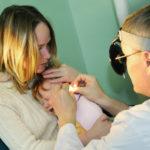 If you have had a routine pap smear exam, which is suggested for women every three years, and it has come back repeatedly with a result of abnormal cells, your Gynecologist may suggest that you have a colposcopy done to further examine the situation and get a better gauge of your cervical health.
If you have had a routine pap smear exam, which is suggested for women every three years, and it has come back repeatedly with a result of abnormal cells, your Gynecologist may suggest that you have a colposcopy done to further examine the situation and get a better gauge of your cervical health.
A colposcopy is a term used to describe a cervical biopsy. A tissue sample may be taken from either outside or inside the cervix, occasionally both are needed for the exam. A typical colposcopy takes only 10-15 minutes at the most.
What you will experience
Much like your yearly wellness exam or pap smear you will be asked to put on a paper gown and lay flat on the exam table, knees up, heels in the stirrups so the doctor can examine you. This position is necessary to be able to clearly see the cervix.
A speculum is inserted and a vinegar-like solution is used to wash the area to be biopsied. The physician will use an instrument called a colposcope (it looks like stand mounted binoculars attached to a light). It is used to examine you visually from several inches away. If at that time abnormal cells are visible a small biopsy is taken.
The colposcopy itself is nearly pain-free. Only the normal pressure of the speculum sliding in is felt and a possible slight sting of the vinegar solution. If you do need the actual biopsy expect slight discomfort. It is described as a sharp pinching which brings on a cramp like you have during a menstrual cycle. Bleeding and dark discharge is to be expected for the next 24 to 48 hours.
While it is often told to patients that they can simply return to work following the procedure, the fact is that this is actually a trauma to the body, however minor, some people do not feel so hot afterwards so if at all possible on the day you have this done, have the rest of the day off to go lay down and rest, just in case. With that said, many feel just fine afterward – it is just better to err on the side of caution.
Following a colposcopy do not have sex, use tampons or use any medication vaginally for a full 24 hours in order for the biopsied area to have time to heal. Your doctor’s office will let you know when the lab results are back and call you to let you know how to proceed based on the findings.
If you are in need of a gynecologist or oncologist in the Lee County, Florida area we invite you to utilize our free resource www.ipalc.org/find. It is a listing of Independent physicians in Lee County who provide the finest health care in Southwest Florida putting the value back in the doctor-patient relationship.


 Breaking out in hives can make you crazy. The itching, the scratching, it can be so intense it keeps you up at night. Nothing seems to help and until you know the source, you feel doomed to bouts at pretty well any moment.
Breaking out in hives can make you crazy. The itching, the scratching, it can be so intense it keeps you up at night. Nothing seems to help and until you know the source, you feel doomed to bouts at pretty well any moment.
 Doctors spend over a decade on schooling, sometimes more depending on the choice of specialty. Is it any wonder that they come out speaking a whole other language than the rest of us?
Doctors spend over a decade on schooling, sometimes more depending on the choice of specialty. Is it any wonder that they come out speaking a whole other language than the rest of us?